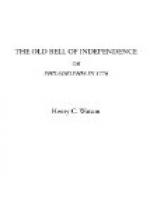“I have always understood that the check received by our troops at Chew’s house gave the enemy time to rally, and thus defeated Washington’s plan,” replied Mr. Jackson Harmar. “If it was otherwise, I should like to be informed of the circumstances.”
“Oh, tell us about the battle of Germantown, Mr. Smith!” exclaimed Mrs. Harmar. She had some acquaintances at Germantown, and she wished to astound them by the extent of her information. “Father says he was not in the battle, being sick at the time. Besides, if he knew, he would never condescend to tell me about it, when he could find Jackson to talk to.”
“Why, I’m sure, my child, you never seemed very anxious to know,” replied old Harmar; “but if you will listen to Mr. Smith, you will know all about it. He was present during the whole battle.”
“Ay; and did my share of the fighting, too,” added Smith. “But I’ll tell you how it was; and you, Mr. Harmar, may judge whether our defeat was owing in any degree to the exertions of the enemy. After General Howe took possession of Philadelphia, the main body of the British was encamped at Germantown. Our army lay at Skippack Creek, about sixteen miles from Germantown. Well, General Washington having received all the reinforcements he expected, and knowing that the enemy had been considerably weakened by sending detachments to take possession of the city and the ports on the river, determined to attempt to surprise them in their camp. The plan was formed with all the judgment and foresight we might expect in Washington. We were to march at night for Germantown. Wayne and Sullivan were to attack the left wing of the enemy in front, whilst Armstrong, with a body of militia, attacked it in the rear. Greene and Stephens were to attack the right wing in front, while Smallwood fell upon its rear. Then there was a strong reserve. Of course, I was with the Pennsylvania line, under Wayne’s command. We started on the evening of the third of October. I shall never forget that night’s march. It was very dark. We could scarcely see three feet from us; and, as we wished to move on so as not to be discovered by any of those who usually gave the enemy information, we carried very few lanthorns. The road, however, was well known, and we marched rapidly and surely. As we approached Germantown, we found an evidence that the enemy were aware of our vicinity, and Wayne determined to attack at once. Just at dawn of day, a party of Sullivan’s troops attacked the picket at the end of the village, and our whole division rushed on as the picket was driven in. The surprise was complete. The enemy could not make a stand. They were broken and routed, and their tents and marquees burnt. We pushed on, took some prisoners, and drove the British from behind fences and houses where they had taken shelter.




